
Digital Transformation in Industrial Demolition Services
Industries of all kinds are adopting technological innovations in the current digital era in order to remain ahead of the curve. Industrial demolition services are now seeing a major digital change; formerly, they were thought to be a manual and labor-intensive procedure. The demolition business is transforming the way buildings are demolished with the aid of state-of-the-art technology and creative methods.
This article explores the newest technologies, approaches, and tactics that are revolutionizing industrial demolition services and goes into the realm of digital transformation in this field. Advancements in technology, such as augmented reality, drones, automated machines, and big data analytics, are improving safety and efficiency while also facilitating accurate planning and economical implementation. Watch this space as we talk about the advantages of digital transformation for the demolition sector.
OUR SERVICES
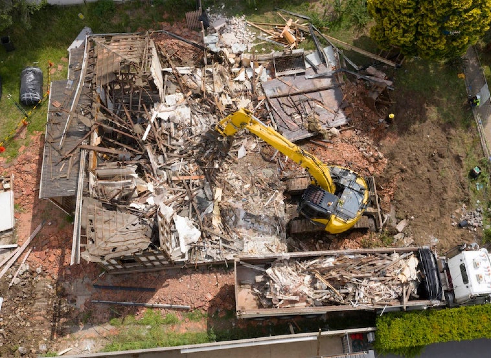
Structure Demolition. Residential, Commercial & Industrial
If your structure poses a health, safety, or environmental risk, demolition can prevent costly citations or fatal accidents. While this may seem daunting, you are just a phone call away from having your residential demolition done professionally, responsibly, and at a great price.
Talk to a Demolition Specialist Now! 916.249.5001
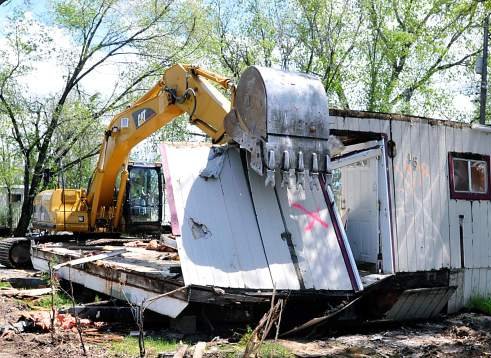
Mobile Home Demolition
We demolish and haul away mobile homes. Any size, anywhere, anyhow. We are fast, clean and competitive. We serve most of Northern California. There are many factors to consider when removing or demolishing your old trailer, mobile home, or manufactured home like: the processes involved, costs, time, contractors, debris, and permits.
Talk to a Demolition Specialist Now! 916.249.5001
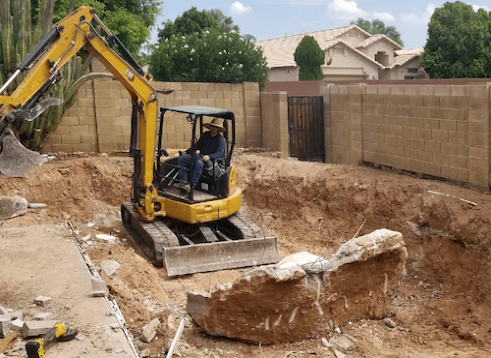
Pool Demolition
When removing a pool in Sacramento, California with the professional demolition team of Maxton Demo, you’re guaranteed peace of mind from beginning to end. From your initial request for an estimate to clean-up, you can expect our pool demolition process that’s completely professional and safe.
Talk to a Demolition Specialist Now! 916.249.5001
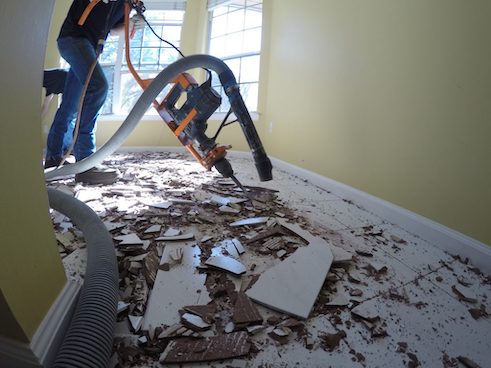
Floor Demolition
Flooring demolition, like any other major home renovation work, requires a specific set of skills and tools to be performed properly. You need experts in flooring demolition to get you the best floors possible. Contact us to find out more about how we can help you today.
Talk to a Demolition Specialist Now! 916.249.5001
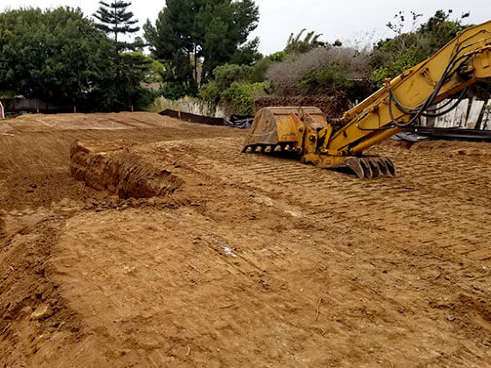
Grading & Excavating
If you need an experienced excavator and grader in Sacramento, call us today. One of the many reasons that residential, commercial, and industrial customers choose to work with us is because we’re able to provide a broad range of services to help construction-related projects get done in less time and at a reduced cost.
Talk to a Demolition Specialist Now! 916.249.5001

Roof Snow Removal
Heavy snow & ice dams can cause significant roof and home damage. Roof Snow removal is our specialty during the winter months. Serving the Sacramento, California area for 10 years, we can get your roof snow removed and promise a quick response and reasonable rates.
Talk to a Demolition Specialist Now! 916.249.5001
Recognizing the Industry’s Need for Digital Transformation
The demolition business, which has always been associated with physical labor and sheer power, is about to undergo a sea change. The need for digital transformation has never been greater, with regulatory challenges, environmental concerns, and the need for increased efficiency and safety all growing.
By improving accuracy, cutting hazards, and simplifying processes, digital technology in the demolition industry offers solutions to these issues. Better planning, real-time monitoring, and more precise risk assessment are made possible by digital technologies, which result in safer, more sustainable, and intelligent demolition procedures.
Moreover, using digital technology helps demolition businesses remain competitive in a world where budgets are tighter and schedules are shorter. These businesses may not only meet but also surpass the changing demands of both customers and regulatory agencies by using digital strategies.
Industrial Demolition Services: Industry Trends and Prospects for Digital Transformation in the Future
A few major themes that will influence the demolition industry’s future are developing as it continues to embrace digital change.
The growing use of robots and autonomous systems in demolition operations is one of the biggest developments. These cutting-edge technologies have the potential to completely transform the way demolition operations are carried out since they can be programmed to carry out certain jobs accurately and efficiently.
A further trend in the demolition sector is the increasing focus on environmental preservation and sustainability. The environmental effects of building and demolition operations are becoming more recognized, and this has put pressure on demolition businesses to adopt more environmentally friendly techniques.
This has prompted the creation of cutting-edge tools and methods that allow demolition materials to be recycled and used again, reducing waste and the carbon footprint of demolition operations.
Finally, a major factor in the future of the demolition business is anticipated to be the growing integration of machine learning (ML) and artificial intelligence (AI). With the aid of these technologies, it is possible to analyze enormous volumes of data, spot patterns and trends, and improve project result forecasts.
The demolition sector may become more competitive and sustainable as a result of better resource allocation, increased safety, and enhanced project management in general.
Using Digital Transformation to Gain an Advantage in the Demolition Sector
Digital transformation adoption is becoming a necessity rather than a luxury as the industrial demolition sector develops. Demolition firms may gain a major competitive advantage by adopting cutting-edge technology and making decisions based on data, producing remarkable outcomes while maintaining the security and longevity of their business.
Although there are some difficulties along the way to digital transformation, they are far outweighed by the advantages. In a more competitive and dynamic sector, demolition firms may position themselves for long-term success by making the necessary technological investments, upskilling their team, and cultivating an innovative culture.
Those that are prepared to embrace digital transformation will prosper as the industry develops, establishing new benchmarks for quality and opening the door for an industrial demolition services sector that is more productive, secure, and long-lasting.
Technology’s Contribution to Increasing Industrial Demolition Efficiency
Effectiveness is a key component in the industrial demolition industry. Effective and efficient demolition operations reduce disturbance to the surrounding environment and neighboring companies while also saving time and money. To stay ahead of the curve in the fast-paced, fiercely competitive industrial scene, businesses are always looking for methods to improve their demolition operations.
Reducing idle time and increasing output are two of the main factors that drive industrial demolition efficiency. Prolonged demolition projects may cause major financial losses since they can cause surrounding companies’ activities to be disrupted and the development of replacement facilities to be delayed. Through the integration of cutting-edge technology innovations, demolition firms may optimize their workflows, minimize project durations, and guarantee a seamless shift to the subsequent stage of building or reconstruction.
Furthermore, efficiency in industrial demolition takes sustainability, safety, and environmental factors into account in addition to speed. It is important to make sure that demolition projects are conducted in a manner that minimizes the risk of accidents, lowers waste, and maintains the local ecology since they may have a substantial influence on the surrounding region. Automation, robots, and data analytics are just a few of the technological innovations that may assist demolition firms in achieving these objectives, thereby increasing their total productivity and competitiveness in the market.
Developments in Technology for Industrial Demolition
The recent quick improvements in technology have brought about a significant revolution in the realm of industrial demolition. The industry has used a broad variety of technical solutions to improve the efficacy and efficiency of demolition operations, from specialist equipment to complex software.
The creation of specialized gear and equipment is one of the most important technical developments in industrial demolition. The days of using wrecking balls and large excavators exclusively for demolition operations are long gone. These days, demolition businesses may choose from a large variety of specialized tools, such as hydraulic shears, remote-controlled demolition robots, and high-reach excavators, which are designed to carry out certain jobs more accurately and efficiently.
These cutting-edge demolition equipments include characteristics that increase production overall, lessen their effect on the environment, and improve operator safety.
To reduce worker injury risk, remote-controlled demolition robots, for example, can operate in confined locations and execute sensitive jobs with great precision. In a similar vein, higher buildings may be safely demolished using high-reach excavators without the need for scaffolding or other temporary structures, which shortens project durations and related costs.
Technology, in addition to specialized equipment, has completely changed the way demolition operations are organized and carried out. With the use of advanced software and data analysis tools, demolition specialists can now evaluate a building’s structural integrity, spot any dangers, and create thorough destruction plans. Utilizing these digital advancements, demolition firms may streamline operations, save costs, and guarantee the security of their personnel and the surrounding area.
Automation and Robotics in Industrial Demolition
The combination of automation and robots is one of the biggest technical advances in the world of industrial demolition. These innovative technologies have revolutionized the execution of demolition operations by providing a number of advantages that improve accuracy, safety, and efficiency.
Robotic demolition systems are designed to do certain jobs with a high level of precision and effectiveness. With the help of specialized attachments like hydraulic shears, concrete crushers, and diamond-tipped saws, this cutting-edge equipment can accurately cut, shatter, and remove construction materials with little to no physical labor. Demolition businesses may shorten project timelines overall, boost productivity, and lower the danger of worker accidents by automating these processes.
Furthermore, regions like high-rise buildings or structures with shaky foundations that are hazardous or impossible for human workers to approach may be accessed by robotic demolition devices. By operating this remote-controlled equipment from a secure distance, demolition crews may accomplish their goals safely and without compromising the safety of their working environment. This degree of control and accuracy is especially important for delicate demolition operations when it is necessary to protect the environment or adjacent infrastructure.
The industry has embraced the use of automated procedures to simplify other areas of demolition operations in addition to robotic demolition equipment. For example, sophisticated algorithms and software may be utilized to detect possible dangers, optimize the order of operations, and simulate the demolition process. In addition to increasing the demolition process’s efficiency, this data-driven strategy guarantees the security of both the surrounding area and the workers.
Industrial Demolition using Drones
Drone usage is another technical breakthrough that has had a big influence on the industrial demolition sector. Unmanned aerial vehicles (UAVs) have emerged as a crucial instrument for demolition experts, offering an array of advantages that augment the efficacy and efficiency of their undertakings.
The capacity to do airborne surveys and inspections of the demolition site is one of the main uses of drones in industrial demolition. Drones with sophisticated sensors and high-resolution cameras may take precise pictures and data that can be used to evaluate a building’s structural integrity, spot any dangers, and create well-thought-out destruction plans. By using this information, the demolition process may be made more efficient, waste can be decreased, and worker and environmental safety can be guaranteed.
Drones may be utilized not just for site inspections but also for real-time progress monitoring on demolition operations. Drones with live-streaming capabilities allow demolition crews to monitor the process in real time, spot problems or obstacles, and quickly change their tactics as necessary. This degree of responsiveness and real-time visibility may greatly improve the demolition process’s overall efficiency by cutting down on downtime and lessening its negative effects on the neighborhood.
Drones may also be used for specialized demolition jobs, such as placing explosive charges or clearing debris. The use of unmanned aerial vehicles may enable demolition teams to operate with increased safety and accuracy by entering regions that are hazardous or challenging for human personnel to access. Demolition firms may streamline their processes, lower the danger of worker accidents, and lessen the environmental effect of their operations by using drone technology.
Industrial Demolition: Virtual and Augmented Reality
The business of industrial demolition has also been greatly impacted by the convergence of virtual reality (VR) and augmented reality (AR). Modern technologies are revolutionizing the way demolition specialists organize, carry out, and oversee their work, improving productivity, accuracy, and safety.
VR and AR may be utilized to build very accurate, three-dimensional models of the demolition site in the context of industrial demolition. Before ever entering the site, these virtual environments enable demolition crews to see the whole project, recognize any obstacles, and plan the best demolition techniques. Demolition specialists can detect and handle any problems, including structural instabilities or the presence of hazardous chemicals, without running the risk of on-site mishaps or delays by modeling the demolition procedure virtually.
Furthermore, throughout the course of the project, demolition workers may get real-time feedback and direction via VR and AR. These technologies may be integrated with the specialized technology and equipment used in demolition to provide personnel with real-time information and directions on how to do duties efficiently, lowering the possibility of mistakes and increasing productivity.
Augmented reality-enabled demolition equipment, for instance, may provide operators with augmented overlays that show where explosive charges are placed, where important structural pieces are located, or if subterranean utilities are present. Because workers may base their choices on the real-time data supplied by the AR system, this information can be very helpful in guaranteeing the safety and accuracy of the demolition process.
In a similar vein, demolition workers may be prepared for obstacles they could encounter on the job site using VR-based training simulations. Workers may gain the knowledge and expertise needed to manage challenging demolition jobs with more competence and confidence by immersing themselves in realistic, virtual surroundings. This will eventually improve the project’s overall efficiency and safety.
Predictive Maintenance and Data Analytics in Industrial Demolition
The efficiency of industrial demolition procedures has also been greatly improved by the incorporation of data analytics and predictive maintenance systems. Demolition businesses may streamline processes, cut down on downtime, and guarantee the long-term dependability of their specialist equipment by using data-driven insights.
Optimizing project planning and execution is one of the main uses of data analytics in industrial demolition. Demolition businesses may create more precise and effective demolition plans by gathering and evaluating historical data on everything from equipment performance to job durations and project schedules. They can identify bottlenecks, optimize processes, and make well-informed choices thanks to this data-driven approach, all of which contribute to an increase in the overall effectiveness of their business operations.
Data analytics may be utilized not only for project optimization but also for the implementation of predictive maintenance plans for the specialized machinery used in industrial demolition. Demolition businesses may proactively plan maintenance and repairs by anticipating probable faults or breakdowns and continually monitoring the operation and condition of their equipment. This lowers the possibility of unplanned downtime and increases the equipment’s lifetime, which results in major cost savings and increased productivity.
Additionally, the use of data analytics may assist demolition businesses in making better-informed choices about the equipment they choose to purchase. Through the examination of data pertaining to the functionality, dependability, and upkeep necessities of various demolition instruments and equipment, businesses may make more astute investments that correspond with their unique demands and operational specifications. The utilization of data to inform equipment management strategies might augment the efficacy and economic viability of industrial demolition undertakings.
Technological Difficulties and Limitations in Industrial Demolition
While there is no denying that the use of technology has improved industrial demolition’s efficacy and efficiency, it is crucial to recognize the difficulties and constraints that accompany these developments.
The substantial initial outlay needed to install and maintain these technical solutions is one of the key obstacles. Smaller demolition businesses could find it difficult to justify the expense of specialized demolition equipment, complex software, and sophisticated data analytics systems, particularly in the near future. This price barrier may prevent these technologies from being widely adopted, which might put businesses that can’t keep up with the industry’s technical improvements at a competitive disadvantage.
Utilizing the technical solutions efficiently requires specific training and knowledge, which presents another barrier. Project managers and demolition workers need to be adept at using the specialized machinery, deciphering the data produced by the analytics and software tools, and making choices based on the information these technologies provide. Ineffective use of the technology may lower total advantages and jeopardize the safety of the demolition process if workers are not adequately trained and supported.
Furthermore, the use of technology in industrial demolition may raise concerns about cybersecurity and data privacy. Demolition businesses need to make sure that the massive volumes of data they gather and retain on their projects are adequately safeguarded from cyber threats and illegal access. The organization and its customers may be exposed to serious dangers if strong data security measures are not put in place, which might erode industry confidence in the use of technology.
And last, demolition firms may have difficulties due to the rapid speed at which technology is developing. Companies need to be flexible and nimble in order to stay ahead of the curve and stay competitive. They also need to be willing to invest in new tools and technology on a constant basis. To secure the long-term sustainability of their operations, this may be a major burden, especially for smaller businesses with fewer resources. Careful planning and smart decision-making may be necessary.
How Technology Will Improve Industrial Demolition Efficiency in the Future
It is obvious that technology will become more and more important in improving the effectiveness, safety, and sustainability of demolition operations as the industrial demolition sector develops. The integration of these technology solutions—from automation and specialized equipment to data analytics and virtual reality—has already revolutionized the way demolition specialists approach their job, and the future holds even more interesting developments.
More advancements in the efficiency and accuracy of demolition operations, together with improved safety protocols that safeguard personnel and the environment, are anticipated as the sector adopts these technological advancements. It is probable that automated systems and robotic demolition equipment will progress and proliferate, enabling demolition businesses to more effectively and efficiently handle even the most intricate and demanding tasks.
Furthermore, the administration and upkeep of demolition equipment will continue to be optimized via the use of data analytics and predictive maintenance technology, which will minimize downtime and guarantee the essential assets’ long-term durability. Comparably, the use of virtual and augmented reality will transform the planning and implementation of demolition projects by allowing experts to model, simulate, and improve their plans of action prior to even stepping foot on the site.
It is obvious that businesses that adopt these technical developments will prosper in the fiercely competitive industrial demolition market as the sector continues to develop. Demolition specialists may become industry leaders by investing in the newest equipment and methods, which will also help them work more efficiently, increase their safety record, and provide outstanding value to their customers.
Do you have a Question?
Talk to a Demolition Specialist Now! 916.249.5001
Request Formal Quote